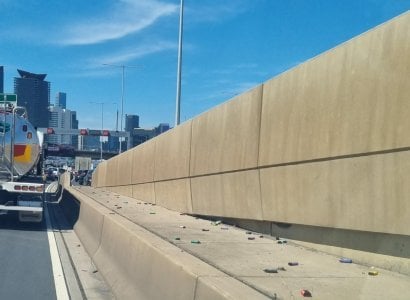Vaping vexation: Aussie roadside litter reveals puffing problem plaguing highways!
- Replies 11
As tensions escalate on the side of Australian roads, a recent incident has shed light on a growing concern that's capturing public attention.
The unsettling scene underscores a broader issue that's increasingly prevalent across the nation's highways and byways.
This latest development serves as a stark reminder of the challenges faced by road users and authorities alike, prompting deeper scrutiny and calls for action to address the underlying problem.
A recent scene on the side of a busy Australian freeway has brought to light a growing problem that intertwines health concerns with environmental neglect—the proliferation of discarded e-cigarettes.
The West Gate Freeway, a bustling artery leading out of Melbourne, became the canvas for an ugly truth when dozens of colourful vapes littered the roadside barrier.
The image, which quickly circulated on social media, showed the electronic devices scattered carelessly, with some locals noting they had been an eyesore for ‘months’.

This unsightly mess not only tarnished the view but also raised questions about the attitudes and habits of those who choose to vape.
‘Is it that hard to put it in your pocket and dispose of it properly?’ one Australian lamented online, echoing the frustration of many who value the country's cleanliness and environmental integrity and deem the sight ‘disgusting’.
‘I've driven past this multiple times on the Westgate outbound,’ another commenter shared.
‘I wonder if it's always just the same person turfing this. Or if it's a community of a******* contributing.’
The issue is not just aesthetic. While tobacco smoking has fallen out of favour in recent years, the surge in vaping—particularly among the youth—is alarming.
According to the Australian Association of Convenience Stores, the number of adult vapers has skyrocketed by 349 per cent over the last five years.
The University of Melbourne has identified vaping as a ‘young person phenomenon’, with Aussies between the ages of 15 and 19 being 13.8 per cent more likely to use e-cigarettes than those in their thirties.
The appeal of flavours like blue raspberry and cola, coupled with viral social media trends, contributed to their soaring popularity.
However, the convenience of vaping comes at a cost.
The long-term health implications of e-cigarettes are still under investigation, yet early evidence suggests they can cause serious respiratory issues and potentially harm the developing adolescent brain—concerns reminiscent of traditional tobacco smoking.
Ironically, e-cigarettes were initially marketed as a smoking cessation aid, yet many now contain tobacco, blurring the lines between solution and problem.
In response to the growing epidemic, the federal government has taken a firm stance, banning the importation of single-use vapes from January 1 this year.
This move aims to address not only the health crisis but also the environmental impact.
The discarded vapes contribute to Australia's staggering 75.8 million tonnes of annual waste.
They also pose a risk of combustion and fire hazards if not properly disposed of, and the chemicals within can pollute waterways and contribute to microplastic waste.
Prime Minister Anthony Albanese expressed he was not personally ‘remotely interested’ in vaping, emphasising the severe ‘damage [to] your health’ they pose.
His administration took additional steps to reduce the popularity of vaping by prohibiting the importation of non-therapeutic vapes into the country in March.
Additionally, he has put forward legislation concerning limitations on the manufacturing and distribution of vapes.
The Department of Transport and Planning was contacted to request additional information regarding the litter observed along the West Gate Freeway.
As concerns mount over the increasing litter problem along Australian roads, attention is drawn to the broader issue of public behaviour and its consequences.
This spotlight on societal habits extends beyond roadside cleanliness, delving into other contentious topics like smoking and vaping regulations.
A recent report shed light on the clandestine realities of smoking or vaping on planes, highlighting the need for stricter enforcement of rules and regulations to address such behaviours in public spaces.
 Have you noticed similar issues in your area? How do you think we can combat this growing crisis? Share your thoughts and stories with us in the comments below.
Have you noticed similar issues in your area? How do you think we can combat this growing crisis? Share your thoughts and stories with us in the comments below.
The unsettling scene underscores a broader issue that's increasingly prevalent across the nation's highways and byways.
This latest development serves as a stark reminder of the challenges faced by road users and authorities alike, prompting deeper scrutiny and calls for action to address the underlying problem.
A recent scene on the side of a busy Australian freeway has brought to light a growing problem that intertwines health concerns with environmental neglect—the proliferation of discarded e-cigarettes.
The West Gate Freeway, a bustling artery leading out of Melbourne, became the canvas for an ugly truth when dozens of colourful vapes littered the roadside barrier.
The image, which quickly circulated on social media, showed the electronic devices scattered carelessly, with some locals noting they had been an eyesore for ‘months’.

Dozens of discarded vapes were spotted along the West Gate Freeway roadside in Melbourne. Credits: Reddit / r/melbourne
This unsightly mess not only tarnished the view but also raised questions about the attitudes and habits of those who choose to vape.
‘Is it that hard to put it in your pocket and dispose of it properly?’ one Australian lamented online, echoing the frustration of many who value the country's cleanliness and environmental integrity and deem the sight ‘disgusting’.
‘I've driven past this multiple times on the Westgate outbound,’ another commenter shared.
‘I wonder if it's always just the same person turfing this. Or if it's a community of a******* contributing.’
The issue is not just aesthetic. While tobacco smoking has fallen out of favour in recent years, the surge in vaping—particularly among the youth—is alarming.
According to the Australian Association of Convenience Stores, the number of adult vapers has skyrocketed by 349 per cent over the last five years.
The University of Melbourne has identified vaping as a ‘young person phenomenon’, with Aussies between the ages of 15 and 19 being 13.8 per cent more likely to use e-cigarettes than those in their thirties.
The appeal of flavours like blue raspberry and cola, coupled with viral social media trends, contributed to their soaring popularity.
However, the convenience of vaping comes at a cost.
The long-term health implications of e-cigarettes are still under investigation, yet early evidence suggests they can cause serious respiratory issues and potentially harm the developing adolescent brain—concerns reminiscent of traditional tobacco smoking.
Ironically, e-cigarettes were initially marketed as a smoking cessation aid, yet many now contain tobacco, blurring the lines between solution and problem.
In response to the growing epidemic, the federal government has taken a firm stance, banning the importation of single-use vapes from January 1 this year.
This move aims to address not only the health crisis but also the environmental impact.
The discarded vapes contribute to Australia's staggering 75.8 million tonnes of annual waste.
They also pose a risk of combustion and fire hazards if not properly disposed of, and the chemicals within can pollute waterways and contribute to microplastic waste.
Prime Minister Anthony Albanese expressed he was not personally ‘remotely interested’ in vaping, emphasising the severe ‘damage [to] your health’ they pose.
His administration took additional steps to reduce the popularity of vaping by prohibiting the importation of non-therapeutic vapes into the country in March.
Additionally, he has put forward legislation concerning limitations on the manufacturing and distribution of vapes.
The Department of Transport and Planning was contacted to request additional information regarding the litter observed along the West Gate Freeway.
As concerns mount over the increasing litter problem along Australian roads, attention is drawn to the broader issue of public behaviour and its consequences.
This spotlight on societal habits extends beyond roadside cleanliness, delving into other contentious topics like smoking and vaping regulations.
A recent report shed light on the clandestine realities of smoking or vaping on planes, highlighting the need for stricter enforcement of rules and regulations to address such behaviours in public spaces.
Key Takeaways
- Dozens of vapes were found littered along the roadside barrier of the West Gate Freeway in Melbourne, highlighting environmental concerns associated with the rise of e-cigarette use.
- The number of adult vapers in Australia increased by 349 per cent over the last five years, with youth being particularly drawn to flavoured e-cigarettes.
- The health implications of vaping are still uncertain, but early evidence suggests significant respiratory issues and a potential impact on adolescent brain development.
- The federal government implemented bans on the importation of single-use and non-therapeutic vapes to tackle the growing problem and associated health risks.







